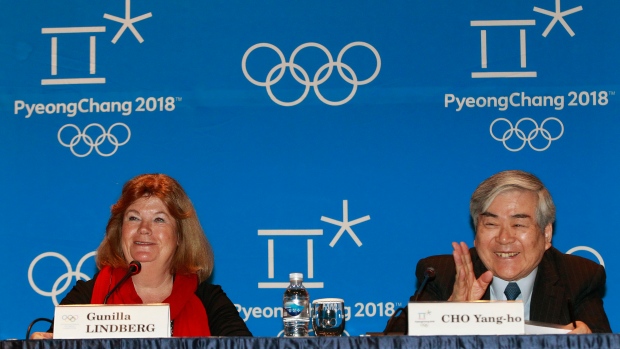Mar 19, 2015
IOC urges South Korea to speed up work
South Korean organizers have taken a "solid step forward" in preparations for the 2018 Winter Games in Pyeongchang but must speed up work on multiple fronts to deliver crucial sports test events next year, the IOC said Thursday after its latest inspection visit.
The Canadian Press

GANGNEUNG, South Korea - South Korean organizers have taken a "solid step forward" in preparations for the 2018 Winter Games in Pyeongchang but must speed up work on multiple fronts to deliver crucial sports test events next year, the IOC said Thursday after its latest inspection visit.
Gunilla Lindberg, who heads the IOC's co-ordination commission for the Pyeongchang Games, said organizers have made significant progress in venue construction but must show more urgency in advancing operational planning and refining budgets.
To compensate for South Korea's lack of experience in hosting large winter sports competitions, Lindberg said international experts will be coming to Pyeongchang in the coming months to help organizers arrange the test events and help in other administrative tasks.
"The first test events are less than a year away and POCOG (Pyeongchang's organizing committee) and its partners will need to focus simultaneously on multiple projects over the next year in order to deliver them successfully," Lindberg said.
International ski federation president and senior IOC member Gian-Franco Kasper recently expressed concern that Pyeongchang would not be ready to host some test events as scheduled next winter. The competitions are vital for testing out the venues and conditions ahead of the games.
Organizers have also been facing pressure from local groups to spread the games outside of Pyeongchang to reduce costs, despite the International Olympic Committee insisting that the current venue plan is final.
The organizers are also having difficulty attracting sponsors, with only five companies having joined the domestic sponsorship program. Organizers announced a sponsorship deal Wednesday with Korean Air.
Lindberg and Christophe Dubi, the IOC's executive director for the Olympic Games, were part of the delegation that concluded a three-day inspection trip in Gangneung, a city near Pyeongchang that will host some Olympic competitions in 2018, including ice hockey, speedskating and figure skating.
Lindberg said a task force set up by the IOC and South Korean organizers to speed up decision-making held its first meeting on Wednesday and held discussions about finalizing the venues, preparing for the test events and accelerating decisions on budgets.
"This is a turning point for Pyeongchang 2018," organizing committee chief Cho Yang-ho said Thursday. "We will move forward aggressively and with momentum, and our main focus will now be on operations."
South Korean government officials had discussed relocating the snowboarding and freestyle skiing venues in Pyeongchang to a resort in nearby Jeongseon to reduce costs but the plans were dropped earlier this month due to concerns about disrupting the test events for snow sports.
Lindberg stressed that there will no longer be any discussions about spreading the Olympic events outside of the currently-defined venues.
"All the venues are confirmed both for the test events and the Olympic Games," she said.
South Korea held the Summer Olympics in Seoul in 1988, co-hosted the soccer World Cup with Japan in 2002 and staged the Asian Games three times, including last year's event in Incheon.
Each event was touted as a celebration of prosperity and the country's elevated international profile. However, the public sentiment surrounding big sporting events is no longer unanimously positive because of growing worries over costs, including the burden of maintaining venues that will have little use after the games.
A group of activists and scholars last week held a news conference urging the government and organizers to move some competitions such as ice hockey and skating to Seoul and neighbouring cities where there are existing facilities.
The South Korean government projects the Pyeongchang Olympics to cost more than 11 trillion won ($9.76 billion).
Pyeongchang is constructing six new competition venues and a separate stadium to hold the opening and closing ceremonies. While a local university has said it will convert the women's ice hockey venue into a gymnasium after the games, the post-Olympic plans for the other facilities are unclear.
Fears over costs have been heightened by the lack of enthusiasm from potential local sponsors. It seemed that Pyeongchang organizers had lost a major potential sponsor in automaker Hyundai when the IOC signed up Japanese auto giant Toyota as a global sponsor last week through 2024.
Cho, however, said there is still room for Hyundai to join the list of domestic sponsors.
